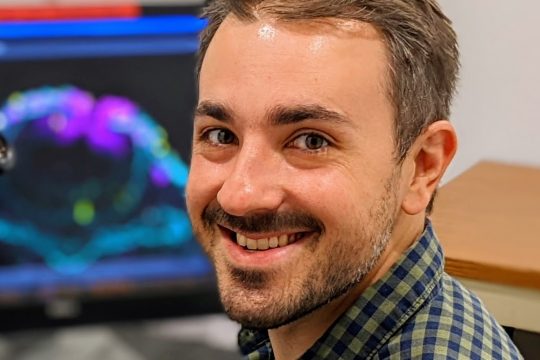Disrupted social behavior is a core feature of compromised mental health, including anxiety and depression, and is a long-standing early diagnostic marker of disorders that emerge in later-life. Yet, we have little understanding of the ontogeny of social behavior...
The Egeblad lab studies the contributions of the tumor microenvironment – in which cancer cells arise and live – to therapy responses and metastasis. Solid tumors are abnormally organized tissues that contain not only cancer cells, but also various...
The Cai lab focuses on understanding how the transcription process is regulated in normal and cancer cells. We are intrigued by the discoveries in our lab that many transcription factors involved in cancers can form small, liquid-like condensates in...
RNA is typically understood as an intermediary molecule between DNA and protein. But, many noncoding RNAs, as well as the noncoding regions of messenger RNA, are increasingly appreciated as important regulators of gene expression and cellular functions. The forefront...
Animals, including humans, have stable relationships with communities of microorganisms collectively referred to as the microbiota. These communities profoundly influence the biology of their hosts, impacting host features such as immune function, metabolism, and even so-called “higher” traits such...
Epithelial-to-mesenchymal transition (EMT) is a cellular lifestyle change that produces highly invasive cells that can migrate long distances in the body. These processes are critical for normal embryonic development but are often reactivated in disease states such as cancer...
Neural circuit mechanisms underlying the development of social behaviors Adolescence is a period of physical and psychological development during which a person develops from a child into an adult. Following the onset of puberty, increased hormonal levels stimulate the...
RNA metabolism dysfunction and RNA-targeting therapy in neurodegeneration The nervous system has extremely complex RNA processing regulation. Dysfunction of RNA metabolism has emerged to play crucial roles in multiple neurological diseases. Mutations and pathologies of several RNA-binding proteins are...
We study the molecular mechanisms underlying a variety of nucleic acid transactions, including DNA transposition, RNA synthesis and RNA processing. The current research focus of my laboratory is to understand the molecular underpinnings and biological significance of complex virus-host...










